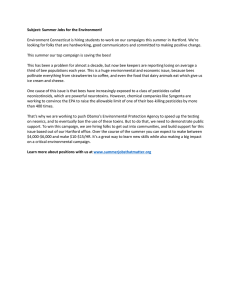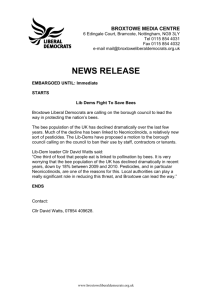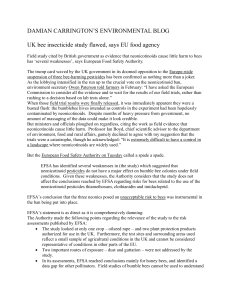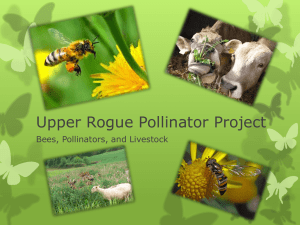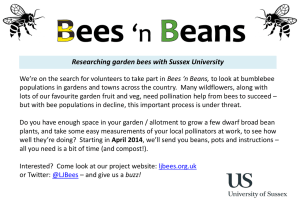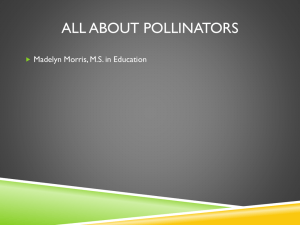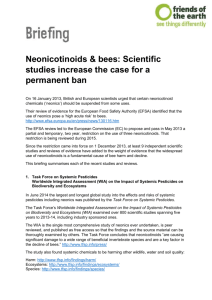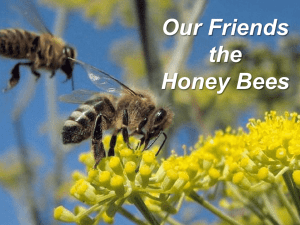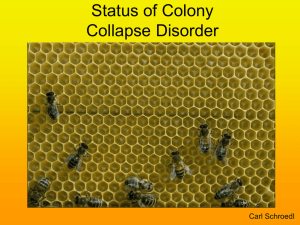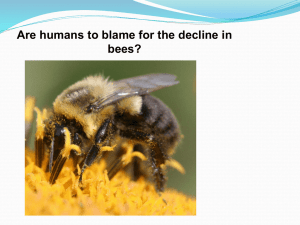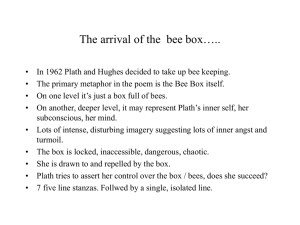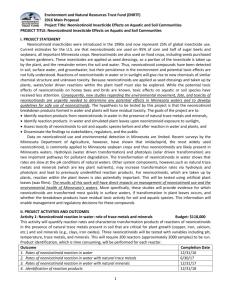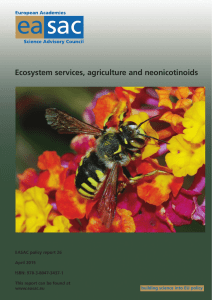Bees, Pesticides and Us
advertisement
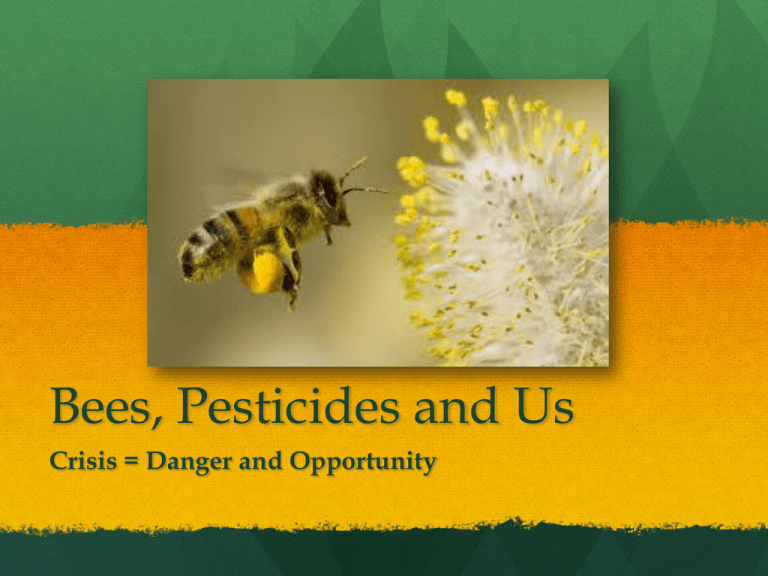
Bees, Pesticides and Us Crisis = Danger and Opportunity The bad news is dire Increasing threats to honey bees abound Winter losses, summer losses, weakened bees Invasive predators, i.e. mites, small hive beetle, etc. Loss of habitat, contaminated habitat Climate change Harm from widespread use of pesticides The wisdom about crisis The ancient Chinese character reminds us Crisis is two-fold, it brings both Danger and Opportunity We have an opportunity Public awareness and concern for honey bees is at an all-time high Public concern is driving political action 90% of Marylanders polled say they are concerned about honey bee hive deaths It’s a big wave, catch it President Obama has established Pollinator Health Task Force Mandates National Pollinator Health Strategy and Pollinator Research Action Plan Also charged with increasing and improving pollinator habitat Beekeeper input needed! Public Listening Sessions on Pollinator Health Task Force Beekeepers needed to present “stakeholder” comments to shape federal policy Attend! Monday, November 17 1 pm – 3 pm Riverdale, MD Webinar option http://tinyurl.com/kle2k2b Marylanders can help bees Maryland has strong opportunity to pass a Neonic/Bee bill in 2015 legislative session Spearheaded by Smart on Pesticides Coalition: 43 organizations (and growing) representing healthcare providers, environmental justice, public health, farmer, environmental, waterkeepers, interfaith and wildlife-related organizations/groups/institutions including 6+ Maryland beekeeper associations are working to craft and pass the bill. Why neonicotinoids? Why now? Neonicotinoid market now 25% of overall pesticide market Annual sales over $2 billion in 2013 Homeowner products have recently flooded home and garden stores Expiring neonicotinoid patents enabled over 40 manufacturers to seize homeowner market, flooding store shelves with neonic-ladened products Evidence of neonicotinoid damage is “conclusive” BBC reports: Widespread impacts of neonicotinoids ‘impossble to deny’ called ‘today’ s DDT’ - BBC News, June 23, 2014 Xerces Society and American Bird Conservancy reviewed 200 studies showing harm to bees and birds from neonicotinoids - Published in 2014 reports Neonics harm babies, bees and aquatic life Researchers have found that neonics are linked to brain damage in children Cause death of molting blue crabs A recent USGS study found them widespread in midwestern streams at levels toxic to aquatic life Evidence mounts for neonicotinoid toxicity on bees Sub-lethal exposure to neonics affects bees ability to repopulate at end of winter; 50% of hives tested showed symptoms of CCD Neonicotinoids interfere with navigation and motor function Neonics let viruses thrive in bees; interfere with immune response Sub-lethal effects of neonics residue in brood comb: Reduce adult bee longevity Increase brood mortality Result in higher fecundity of Varroa mites Increase susceptibility of pathogens Impede queen and workers’ ability to meet demand of brood production 200 studies show harm to bees, birds, aquatic life Fatal powdering of bees in flight with particulates of neonicotinoids seed coating; is worsened with humidity Synergistic effects of neonicotinoids and pyrethroid pose highest risk by contact exposure Synergisim with fungicides results in much higher risks in spite of low levels Maryland Neonics/Bee bill Bill would restrict homeowners from buying home and garden products containing bee-killing neonicotinoids Agricultural, veterinary and professional applicators’ usage would not be affected by this bill Protects garden habitats Cosmetic use of neonicotinoid pesticides in gardens, lawns and landscapes may be an important contributing factor in declining bee and wild pollinator health There are over 146 low-toxicity alternatives that can replace neonics for common uses Maryland Neonics/Bee bill Bill would require “bee-friendly” plants that have been treated with neonics to be labeled, as containing pesticide deadly to pollinators In June 2014, a FOE study found more than half of “beefriendly” plants sold to unsuspecting consumers at Home Depot and Lowes stores across the US and in Maryland, had significant levels of at least three neonicotinoids, at sufficient levels to kill bees outright, and 40% of the plants were treated with two or more neonics. We need your help 1. Vote to have Susquehanna Beekeepers join the Smart on Pesticides Coalition Any questions about SOPC? Stand up for our girls 2. Get vocal. Take action. Make the most of this opportunity! Sign and distribute petitions Write letters to your legislators and Governor Hogan, write Letters to the Editor Call your representatives and educate them about why its so important to support bee-friendly legislation Stand up for our girls 3. Get visible! Submit your comments to Pollinator Health Task Force (November 17) Attend Maryland legislative events (SOPC) Visit your representatives at their offices Last session on the pesticide database funding bill, the legislators asked “Where are the beekeepers?” We are the symbol that the issue matters! Getting involved works! In 2014, SOPC won a $10 fee increase to fund the Pesticide Database to help honey bee researchers. Beekeepers were an important voice at the table – legislators were extremely interested in what we beekeepers had to say. Getting involved works! Questions & comments? Thank you!
